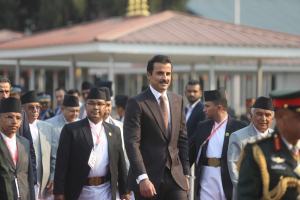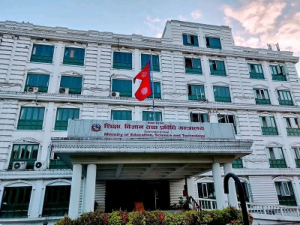The Ministry of Health and Population (MoHP) has said antigen test will be conducted to detect COVID-19 patients. Revising its national testing guideline, MoHP has set the criteria for antigen-based testing.
According to Dr Jageshwor Gautam, spokesperson for MoHP, the test will be useful for mass screening, for urgent report at health centres, and for people living in congested settings such as in barracks, prisons and elderly care homes.
“The report of the test comes faster than that of the real time polymerase chain reaction,” said Gautam.
“If the result of the antigen test is positive, we will classify it as positive and if its negative we will think of it as negative and ask patients about their symptoms.”
“If there are no symptoms then we will wait, but if s/he is symptomatic we will isolate and conduct PCR test. If the person tests positive, we will keep them in isolation and if they test negative, we will look for other causes,” added Gautam.
The revised guideline also says that RT-PCR and antigen test will be used for diagnostic purpose while serology test will be conducted for surveillance and research purpose.
According to World Health Organisation (WHO), antigen-detection diagnostic tests are designed to directly detect SARS CoV-2 proteins produced by replicating virus in respiratory secretions and have been developed as both laboratory-based tests and for near-patient use, so it’s called Rapid Diagnostic Tests, or RDTs.
The government had earlier stopped conducting Rapid Diagnostic Tests after controversies and protests.
Shravan Kumar Mishra, virologist at National Public Health Laboratory, said, “The government should first ensure the quality of test kits by testing those who have tested positive for coronavirus for its efficacy or else it will again lead to problems related to RDT kits used earlier.”
Revising its criteria for testing, MoHP said tests will be conducted on all symptomatic cases (fever or cough or shortness of breath or loss of taste or loss of smell or diarrhoea), all contacts with confirmed cases, all patients with severe acute respiratory illness, all returnees (ground crossing at point of entry, air route, at quarantine within five to seven days of arrival, all frontline healthcare workers and other frontline workers, all individuals with history of travel to COVID-19 transmission areas in the last 14 days, all ICU cases, individuals with underlying chronic conditions, especially individuals above 60 years of age and pre-operative cases.
The revised national guideline also says test report should not be awaited for emergency procedures and surgeries.
The guideline explains that “test will be conducted for discharge of moderate/severe/critical cases of COVID-19 based on clinical judgement. But test is not required for asymptomatic/ mild cases who have completed 14 days (at least three days without symptoms).”



